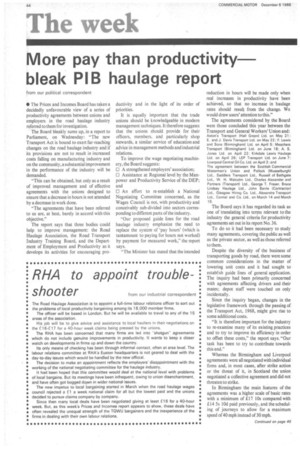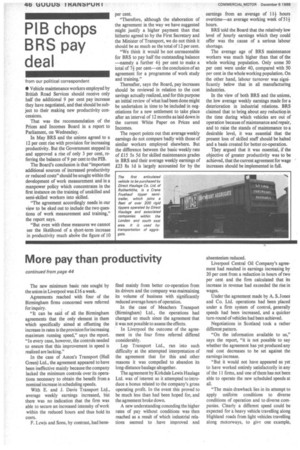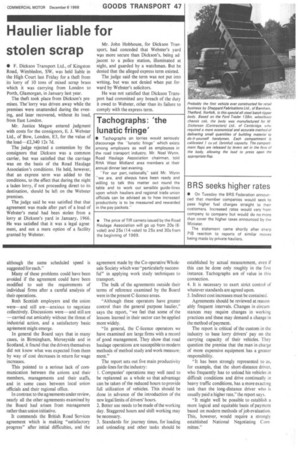More pay than productivity bleak PIB haulage report
Page 46

Page 48

Page 49

If you've noticed an error in this article please click here to report it so we can fix it.
from our political correspondent • The Prices and Incomes Board has taken a decidedly unfavourable view of a series of productivity agreements between unions and employers in the road haulage industry referred to them for investigation.
The Board bleakly sums up, in a report to Parliament, on Wednesday: "The new Transport Act is bound to exert far-reaching changes on the road haulage industry and if its provisions are not to result in increased costs falling on manufacturing industry and on the community, a substantial improvement in the performance of the industry will be demanded.
"This can be obtained, but only as a result of improved management and of effective agreements with the unions designed to ensure that a decrease in hours is not attended by a decrease in work done.
"The agreements that have been referred to us are, at best, barely in accord with this objective."
The report says that three bodies could help to improve management: the Road Haulage Association, the Road Transport Industry Training Board, and the Department of Employment and Productivity as it develops its activities for encouraging pro
ductivity and in the light of its order of priorities.
It is equally important that the trade unions should be knowledgeable in modern management techniques. It therefore suggests that the unions should provide for their officers, members, and particularly shop stewards, a similar service of education and advice in management methods and industrial relations.
To improve the wage negotiating machinery, the Board suggests: O A strengthened employers' association; O Assistance at Regional level by the Manpower and Productivity Service of the DEP; and O An effort to re-establish a National Negotiating Committee concerned, as the Wages Council is not, with productivity and conceivably sub-divided into sectors corresponding to different parts of the industry.
"Our proposed guide lines for the road haulage industry emphasize the need to replace the system-of 'pay hours' (which is tantamount to paying for hours not worked) by payment for measured work," the report says.
"The Minister has stated that the intended reduction in hours will be made only when real increases in productivity have been achieved, so that no increase in haulage rates should result from the change. We would draw users' attention to this."
The agreements considered by the Board were those concluded this year between the Transport and General Workers' Union and:
Aston's Transport (Hall Green) Ltd. on May 21: E. and J. Davis Transport Ltd. on May 22; F. Lewis and Sons (Birmingham) Ltd, on April 5: Meachers Transport {Birmingham} Ltd. on June 18: A. S. Jones Ltd. on April 22: Kirkdale Lewis Haulage Ltd. on April 26; LEP Transport Ltd. on June 7: Liverpool Central Oil Co. Ltd. on April 3; and The agreement between the Scottish Commercial Motormen's Union and Pollock IMusselburgh) Ltd.. Saddlers Transport Ltd., Russell of Bathgate Ltd., W. H. Malcolm Ltd., Charles Alexander and Partners (Transport} Ltd., George T. Fraser, Bruce Lindsay Haulage Ltd.. John Barrie (Contractor) Ltd., Glasgow Hiring Co. Ltd., Alexandra Transport Ltd.. Connal and Co. Ltd.. on March 14 and March 18.
The Board says it has regarded its task as one of translating into terms relevant to the industry the general criteria for productivity agreements set out in its report No. 36.
To do so it had been necessary to study many agreements, covering the public as well as the private sector, as well as those referred to them.
Despite the diversity of the business of transporting goods by road, there were some common considerations in the matter of lowering unit costs and it had sought to establish guide lines of general application. The inquiry had been primarily concerned with agreements affecting drivers and their mates; depot staff were touched on only incidentally.
Since the inquiry began, changes in the legislative framework through the passing of the Transport Act, 1968, might give rise to some additional costs.
"It is therefore important for the industry to re-examine many of its existing practices and to try to improve its efficiency in order to offset these costs," the report says. "Our task has been to try to contribute towards this end."
Whereas the Birmingham and Liverpool agreements were all negotiated with individual firms and, in most cases, after strike action or the threat of it, in Scotland the union negotiated a collective agreement and did not threaten to strike.
In Birmingham the main features of the agreements was a higher scale of basic rates with a minimum of £17 10s compared with £14 5s 10d paid previously, and the scheduling of journeys to allow for a maximum speed of 40 mph instead of 30 mph. The new minimum basic rate sought by the union in Liverpool was £16 a week.
Agreements reached with four of the Birmingham firms concerned were referred for inquiry.
"It can be said of all the Birmingham agreements that the only element in them which specifically aimed at offsetting the increase in rates is the provision for increasing maximum running speed," says the report. "In every case, however, the controls needed to ensure that this improvement in speed is realized are lacking."
In the case of Aston's Transport (Hall Green) Ltd., the agreement appeared to have been ineffective mainly because the company lacked the minimum controls over its operations necessary to obtain the benefit from a nominal increase in scheduling speeds.
With E. and J. Davis Transport Ltd., average weekly earnings increased, but there was no indication that the firm was able to secure an increased intensity of work within the reduced hours and thus hold its costs.
F. Lewis and Sons, by contrast, had bene
fited mainly from better co-operation from its drivers and the company was maintaining its volume of business with significantly reduced average hours of operation.
In the case of Meachers Transport (Birmingham) Ltd., the operations had changed so much since the agreement that it was not possible to assess the effects.
In Liverpool the outcome of the agreement in the four firms referred differed considerably.
Lep Transport Ltd., ran into such difficulty at the attempted interpretation of the agreement that for this and other reasons it was compelled to abandon its long-distance haulage altogether.
The agreement by Kirkdale Lewis Haulage Ltd. was of interest as it attempted to introduce a bonus related to the company's gross operating profit. In the event this proved to be much less than had been hoped for, and the agreement broke down.
A new understanding conceding the higher rates of pay without conditions was then reached as a result of which industrial relations seemed to have improved and absenteeism reduced.
Liverpool Central Oil Company's agreement had resulted in earnings increasing by 20 per cent from a reduction in hours of two per cent and the firm calculated that its increase in revenue had exceeded the rise in wages.
Under the agreement made by A. S. Jones and Co. Ltd. operations had been placed under a firm system of control, generally speeds had been increased, and a quicker turn-round of vehicles had been achieved.
Negotiations in Scotland took a rather different pattern.
"On the information available to us," says the report, "it is not possible to say whether the agreement has yet produced any real cost decreases to be set against the earnings increase.
"But it would not have appeared as yet to have worked entirely satisfactorily in any of the Ii firms, and one of them has not been able to operate the new scheduled speeds at all.
"The main drawback lies in its attempt to apply uniform conditions to diverse conditions of operation and to diverse companies. Clearly a different speed could be expected for a heavy vehicle travelling along Highland roads from light vehicles travelling along motorways, to give one example, although the same scheduled speed is suggested for each."
Many of these problems could have been avoided if the agreement could have been modified to suit the requirements of individual firms after a careful analysis of their operations.
Roth Scottish employers and the union were—and still are—anxious to negotiate collectively. Discussions were—and still are —carried out amicably without the threat of industrial action, and a satisfactory basic agreement might emerge.
In general the Board says that in many cases, in Birmingham, Merseyside and in Scotland, it found that the drivers themselves did not know what was expected from them by way of cost decreases in return for wage increases.
This pointed to a serious lack of communication between the unions and their members, managements and their staffs, and in some cases between local union officials and their regional office.
In contrast to the agreements under review, nearly all the other agreements examined by the Board had arisen from management rather than union initiative.
It commends the British Road Services agreement which is making "satisfactory progress" after initial difficulties, and the agreement made by the Co-operative Wholesale Society which was "particularly successful" in applying work study techniques to transport.
The bulk of the agreements outside their terms of reference examined by the Board were in the present C-licenceereas.
"Although these operators have greater control than the general purpose haulier," says the report, "we feel that some of the lessons learned in their sector can be applied more widely.
"In general, the C-licence operators we have examined are large firms with a record of good management. They show that road haulage operations are susceptible to modern methods of method study and work measure-_ ment."
The report sets out five main productivity guide-lines for the industry: 1. Companies' operations may well need to be replanned as a whole so that advantage can be taken of the reduced hours to provide full utilization of vehicles. This should be done in advance of the introduction of the new legal limits of drivers' hours.
2. Better use needs to be made of the working day. Staggered hours and shift working may be necessary.
3. Standards for journey times, for loading and unloading and other tasks should be
established by actual measurement, even if this can be done only roughly in the first instance. Tachographs are of value in this connection.
4. It is necessary to exert strict control of whatever standards are agreed upon.
5. Indirect cost increases must be contained.
Agreements should be reviewed at reason ably frequent intervals. Changes in circumstances may require changes in working practices and these may demand a change in the method of payment.
The report is critical of the custom in the industry to base lorry drivers' pay on the carrying capacity of their vehicles. They question the premise that the man in charge of more expensive equipment has a greater responsibility.
"It has been strongly represented to us, for example, that the short-distance driver, who frequently has to unload his vehicles in difficult conditions and drive continually in heavy traffic conditions, has a more exacting task than the long-distance driver who is usually paid a higher rate," the report says.
"It might well be possible to establish a more logical and equitable basis of payment based on modern methods of job evaluation. This, however, would require a strongly established National Negotiating Committee."








































































































































































